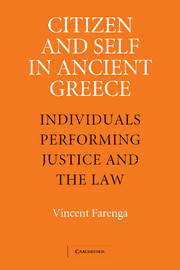Book contents
- Frontmatter
- Contents
- Acknowledgments
- Introduction
- 1 Justice to the Dead: Prototypes of the Citizen and Self in Early Greece
- 2 Performing Justice in Early Greece: Dispute Settlement in the Iliad
- 3 Self-Transformation and the Therapy of Justice in the Odyssey
- 4 Performing the Law: The Lawgiver, Statute Law, and the Jury Trial
- 5 Citizenship by Degrees: Ephebes and Demagogues in Democratic Athens, 465–460
- 6 The Naturalization of Citizen and Self in Democratic Athens, 450–411
- 7 Democracy's Narcissistic Citizens: Alcibiades and Socrates
- Conclusion
- References
- Index
2 - Performing Justice in Early Greece: Dispute Settlement in the Iliad
Published online by Cambridge University Press: 23 July 2009
- Frontmatter
- Contents
- Acknowledgments
- Introduction
- 1 Justice to the Dead: Prototypes of the Citizen and Self in Early Greece
- 2 Performing Justice in Early Greece: Dispute Settlement in the Iliad
- 3 Self-Transformation and the Therapy of Justice in the Odyssey
- 4 Performing the Law: The Lawgiver, Statute Law, and the Jury Trial
- 5 Citizenship by Degrees: Ephebes and Demagogues in Democratic Athens, 465–460
- 6 The Naturalization of Citizen and Self in Democratic Athens, 450–411
- 7 Democracy's Narcissistic Citizens: Alcibiades and Socrates
- Conclusion
- References
- Index
Summary
as performances of justice, the iliad's scripts of funerary ritual (especially lamentation) and chieftain deliberation (especially when redistributing plunder) provide prototypes for the nascent state and its citizen because they succeed in exposing the basileus of the Formative period (ca. 900–760) as a problematic person. We've seen that an Agamemnon or an Achilles becomes controversial by exercising greater moral autonomy than others, especially within scripts designed to redistribute timê competitively. If their problematic decision making reflects with any accuracy the realities of this period, then by the eighth century a chieftain's attempt to evaluate his own worth in relation to social rivals often provoked criticism of his validity claims. But we must remember that the basileus enjoyed moral privileges not only in the Iliad's wartime scripts but in peacetime too. As we saw in Chapter 1 the role of basileus is enacted as a center in exchange relationships of reciprocity and redistribution in village and regional polities, combining elements of the authority identified with a headman, big man, or chief. In this chapter we'll examine a script whose successful outcome was vital to the Formative period's fragile, village-based societies, which from time to time witnessed among their households and descent groups intractable disputes that threatened community stability. This is the earliest judicial script we can reconstruct; we might call it “rendering a dikê” or “rendering the ‘straightest’ dikê,” which is the nonviolent solution most acceptable to all parties and most in conformity with tradition.
- Type
- Chapter
- Information
- Citizen and Self in Ancient GreeceIndividuals Performing Justice and the Law, pp. 109 - 173Publisher: Cambridge University PressPrint publication year: 2006



